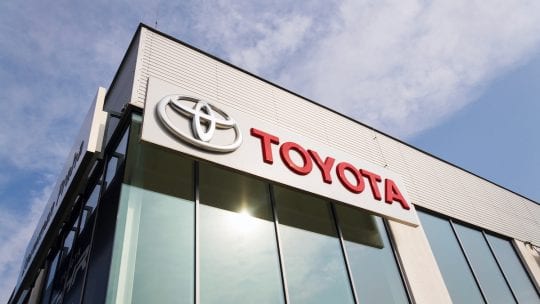
What a start to the week for anyone working for Toyota PR.
Happy Monday to Toyota's communications department.
— andrew kaczynski (@KFILE) June 28, 2021
Axios released a report late Sunday (June 27) regarding the car maker’s political donations, which included funding for 37 Republicans who objected to certifying 2020 presidential election results.
Toyota is the no. 1 donor to Republicans who objected to certifying the 2020 election results — by farhttps://t.co/6zPD5LNpnR pic.twitter.com/coBWOnORoa
— Axios (@axios) June 27, 2021
Toyota issued a statement to Axios acknowledging the donations, but vaguely notes where it draws the line.
"We do not believe it is appropriate to judge members of Congress solely based on their votes on the electoral certification," a Toyota spokesperson said in a statement emailed to Axios. "Based on our thorough review, we decided against giving to some members who, through their statements and actions, undermine the legitimacy of our elections and institutions.”
Regardless of the statement to Axios, Toyota has yet to post a more-detailed response in its press room or on social media. Surely, the team may be taking its time responding, but in the meantime the company is taking heat from car owners and public figures.
Hey @Toyota! My family owns two Priuses (or Prii). One is ten years old and ready for a replacement. We won’t purchase another Toyota again. Have a nice day. https://t.co/MjFid6yd3g
— Jennifer Taub (@jentaub) June 28, 2021
Toyota makes great cars. But they are a threat to American democracy. https://t.co/r6DoUiOSK8
— Howard Dean (@GovHowardDean) June 28, 2021
Shame on you @Toyota. My next car will not be yours.
— Robyn Chance (@robynkchance) June 28, 2021
Many buyers and owners probably could have excused the original donation with a more detailed explanation. However, the response from Toyota doubles down on its decision, alienating an overwhelming sector of the American public who may not agree with its political posturing. The statement could impact share prices, and may trickle down into the profits of franchise ownerships if no action is taken.
And corporations are getting wise to the implications of their political donations. Early this month, JPMorgan Chase & Co. froze political contributions to to Republican members of Congress who voted to overturn President Joe Biden’s election victory, according Reuters.
"This was a unique and historic moment when we believe the country needed our elected officials to put aside strongly held differences and demonstrate unity," the bank wrote of the Jan. 6 vote to certify Biden's win in a memo to staff.
In the wake of Jan. 6, JPMorgan and a slew of other companies cancelled, froze or reconsidered political donations to lawmakers who voted against certifying the election. Some companies decided to halt or rethink political contributions to all politicians.
Eric Yaverbaum, CEO of Ericho Communications, says Toyota needs to do more.
"[The statement] is not sufficient," he says. "Saying one thing and doing another is always going to create brand image and PR issues and will consistently draw backlash. Especially over something as important as democracy itself. It's vital that brand actions and brand values are in alignment. When there's a disconnect between the two, your brand becomes muddled and you risk losing public trust—it looks hypocritical, inauthentic, and dishonest, all things that, if ignored, can severely damage a brand."
And while timing is crucial in a crisis, Yaverbaum believes Toyota's short, quick response was not the way to go.
"A knee-jerk, defensive response is always one of the worst, if not the worst, ways to respond to criticism," he says. "All it does is dig you in deeper while ignoring the issue at hand—and it'll only add fuel to the fire and prolong the life of the crisis."
And if you search the keyword "Toyota" today on Twitter, you'll find this situation is not just going to go away for the auto maker. It's a lesson for any brand, especially when the public has the greatest research tool in its hands—the Internet—which allows informed consumers to look into the backgrounds of companies, leading to their decisions of how to spend money.
"Brands are going to continue to face this kind of criticism and crisis," Yaverbaum says. "The public doesn't have a tolerance for brands saying they support one thing while giving money to politicians and groups who are doing another. Corporate America simply can't get away with using its money to influence through politics as it has in the past without risking scandal."
And while Toyota is feeling the heat, it still has a chance to recover the trust of the public.
"Building a trustworthy brand identity means always ensuring that the way your business operates, your processes, the way you treat your employees and customers, how you work within the communities you rely on, who you support, who you work with, who you give money to, and every other facet of your company, all must be aligned with who you say you are," Yaverbaum says.
He adds, "It’s not just about what you say—actions speak much louder than words. So what you’re putting out there and what you’re saying has to align with what you’re doing. And when it doesn’t, you will need to address incongruities with concrete and tangible actions that demonstrate a clear change in course."
Nicole Schuman is senior editor for PRNEWS. Follow her @buffalogal
